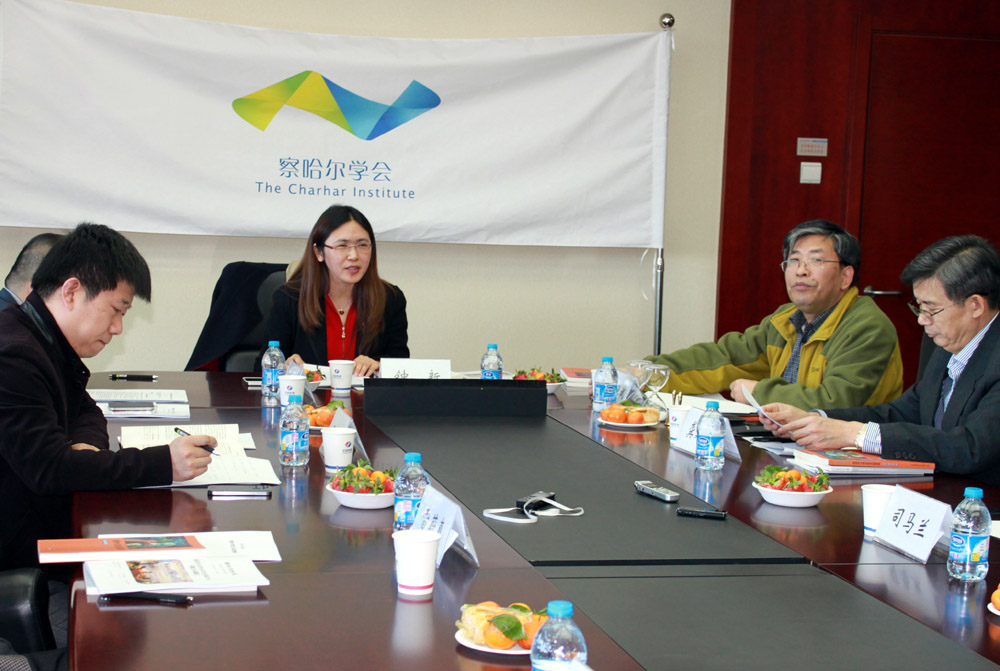China diplomacy weak in social media
- By Zhang Rui
 0 Comment(s)
0 Comment(s) Print
Print E-mail China.org.cn, January 30, 2015
E-mail China.org.cn, January 30, 2015
Experts at a think tank roundtable on Thursday in Beijing said that China's so-called "social media diplomacy" is still weak in the international community due to Internet blockages and lack of activity.
A new book titled "The Concept and Practice Strategy of Microblog Diplomacy" written by Zhong Xin, a professor from the School of Journalism and Communication of Renmin University, and Huang Chao, a Ph.D. from the same school, was just published in China. The authors joined a panel of experts from a civil think tank, the Charhar Institute, to share their insight into the social media activities of the governments and organizations of China and foreign countries.
Professor Zhong said people can communicate with each other and spread information to any corner of the world by using social network technologies. Some foreign countries are using multiple agents to do propaganda and diplomacy work, which means that everyone from the public sector, private sector, NGOs or even individuals can spread his or her beliefs and values to influence people in other countries.
"The multiple-agents public diplomacy is called 'new public diplomacy,'" she said. "Government representatives such as the United States Embassy in China; corporations such as BMW, Starbucks and Samsung; NGOs such as the World Wide Fund for Nature; the Chinese-speaking Canadian performer Mark Henry Rowswell.... they all have their microblogs in China and tweet about remarkable content to influence Chinese people."
But in China, "the social media diplomacy by China's government and other entities are lagging behind on Twitter and Facebook," she said. "For example, by the end of 2013, we didn't find any Twitter accounts for the Chinese embassies in the United Kingdom and the United States. Some progress was made in 2014, as I know about 10 Chinese embassies in foreign countries have started using Twitter by now."
According to a survey conducted on Sept. 10, 2014, BBC Worldwide had 7.81 million likes on Facebook and 7.27 million followers on Twitter. It also had 856,938 subscribers on YouTube, and its videos were viewed 856 million times. By comparison, China's CCTV News had 125,969 likes on Facebook, 27,500 followers on Twitter and 6,337 subscribers on YouTube, and its videos were viewed only 4.37 million times.
Zhu Chengming, an official from the State Council Information Office who attended the roundtable, admitted that foreign embassies and organizations did far better jobs on China's microblogging sites, flooding into China's social media and opening accounts.
"But our organizations and enterprises don't do enough on Weibo or other social media platforms," he said, "and we can't log on to Twitter and Facebook when we are in China because it is a double-edged sword: If the Internet blocks were to be removed, we could export information to others, and they could send theirs back to us. For now, this is not easy to control, so the status quo will stay in place for a while. China is still a developing country, and we need time to strengthen it and have more confidence in ourselves. But I believe in the future, China will be more open to embracing the world, and then we can free our minds."
As Professor Zhong Xin also stressed, social media diplomacy is a competition among multiple parties. "It is a competition of information, a competition of attention, and a competition of influence. We should have the awareness to move forward actively. Only active advocates and promoters can win the competition and gain a greater share of influence."
She suggested that social media platform administrators should deeply understand and take to heart both their target audiences' demands and their own goals, advantages and resources. She also advised administrators to examine the unique nature of their platforms in order to follow and share hot topics, breaking news, pop culture, etc. to build emotional connections and showcase the values and humanity of China.
Zhong added that public diplomacy requires patience and time to build connections and brands. It is a long-term strategy built upon creativity, appeal and public credibility. She asserted that any entities who wanted to do social media diplomacy should have faith in the concepts of "win-win" and "mutual benefit," which can send a positive message to the public in other countries through the Internet.







Go to Forum >>0 Comment(s)